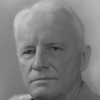Chester W. Nimitz

Chester W. Nimitz
Chester William Nimitzwas a fleet admiral of the United States Navy. He played a major role in the naval history of World War II as Commander in Chief, United States Pacific Fleet, for U.S. naval forces and Commander in Chief, Pacific Ocean Areas, for U.S. and Allied air, land, and sea forces during World War II...
NationalityAmerican
ProfessionWar Hero
Date of Birth24 February 1885
CityFredericksburg, TX
CountryUnited States of America
Among the men who fought on Iwo Jima, uncommon valor was a common virtue.
It is the function of the Navy to carry the war to the enemy so that it will not be fought on U.S. soil.
I felt that it was an unnecessary loss of civilian life... We had them beaten. They hadn't enough food, they couldn't do anything.
The battle of Iwo Island has been won. The United States Marines by their individual and collective courage have conquered a base which is as necessary to us in our continuing forward movement toward final victory as it was vital to the enemy in staving off ultimate defeat.
If you're not making waves, you're not under weigh.
By their victory, the 3rd, 4th and 5th Marine Divisions and other units of the Fifth Amphibious Corps have made an accounting to their country which only history will be able to value fully. Among the Americans who served on Iwo Island, uncommon valor was a common virtue.
A ship is always referred to as 'she' because it costs so much to keep one in paint and powder.
Luck can be attributed to a well-conceived plan carried out by a well-trained and indoctrinated task group.
Some of the best advice I've had comes from junior officers and enlisted men.
When you're in command, command.
When I assumed command of the Pacific Fleet in 31 December, 1941; our submarines were already operating against the enemy, the only units of the Fleet that could come to grips with the Japanese for months to come. It was to the Submarine Force that I looked to carry the load until our great industrial activity could produce the weapons we so sorely needed to carry the war to the enemy. It is to the everlasting honor and glory of our submarine personnel that they never failed us in our days of peril.
Leadership consists of picking good men and helping them do their best.
God grant me the courage not to give up what I think is right even though I think it is hopeless.
THEY FOUGHT TOGETHER AS BROTHERS-IN-ARMS. THEY DIED TOGETHER AND NOW THEY SLEEP SIDE BY SIDE. TO THEM WE HAVE A SOLEMN OBLIGATION.